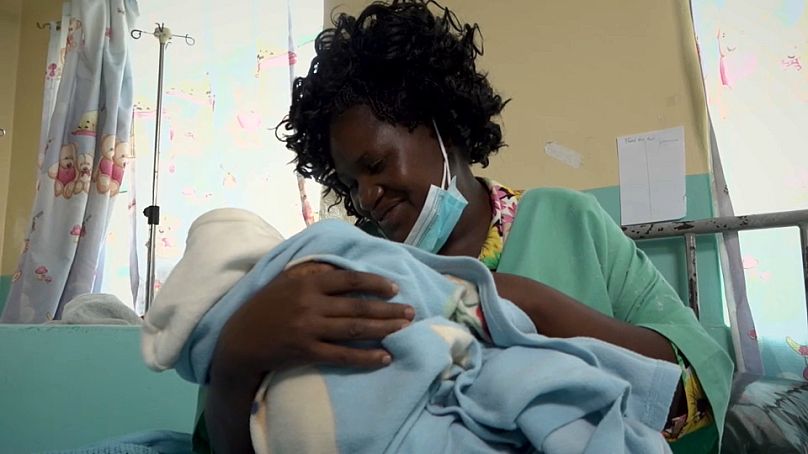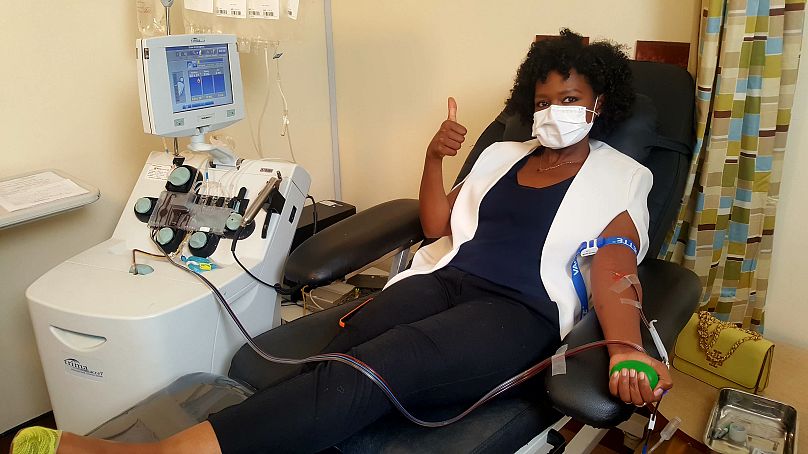Global Japan finds out how a Japanese medical tech company is helping to save lives of mothers in sub-Saharan Africa.
Thousands of mothers die in sub-Saharan Africa every year with demand for blood outstripping supply. Global Japan looks at how a Japanese medical tech company is working to change that.
Giving birth to a third child last year almost cost Lilian her life. After undergoing a caesarian section in Nandi County in Kenya, where she lives, she suffered a postpartum haemorrhage and needed a life-saving transfusion.
“When the doctor arrived and started attending to me, my entire body felt a sudden chill. My whole body went cold. After about 30 minutes, I started regaining my energy. If that blood (from donors) hadn’t been available at the hospital, my newborn daughter would have grown (up) without a mother,” Lilian told Euronews.
Maternal mortality
While Lilian survived, every day more than 800 women die during pregnancy and childbirth around the world. Many of the causes are preventable. Two-thirds of those maternal deaths happen in Sub-Saharan Africa and up to nearly half of them are down to severe bleeding with demand for blood outstripping supply.
Philana Mugyenyi is from Terumo Blood and Cell Technologies, part of Japan’s Terumo Group. It provides technology and software in Africa for collecting and preparing blood and cells for treatments.
When we meet her, Philana is donating blood platelets via automated Terumo BCT technology. Before it arrived, up to six donors were needed to generate one unit for a patient. Now a single donor is enough.
“In Africa, we don’t yet have a culture of donating blood, and this is for many reasons. Some of them are cultural, some are lack of awareness,” Philana explains.
According to Terumo BCT research, more than 16,000 mothers' lives could be saved each year in Kenya, Ghana and Ivory Coast. That’s if enough blood was available to treat postpartum haemorrhage, like that suffered by Lillian in Nandi.
“What it found is over and above the investment required, and beyond the 16,000 lives saved, cost savings of over 20 million euros could be made annually by ensuring mothers have access to blood,” says Philana.
In addition to supporting blood donor events on International Women’s Day in Kenya, Terumo BCT is educating and training medical professionals in transfusion. It has also set up a pan-African coalition which is working to boost blood supplies.
“The provision of safe, adequate blood is a possibility in this country," says Doctor Nancy Okinda, a Haematologist at Aga Khan University Hospital Nairobi.
"The government has to work with the hospitals and all the private institutions to ensure that we have a robust donor registry, and also to acquire technologies that will help them maximise the number of donors they have,” she adds.
Philana explains the situation, telling Euronews: “We have solutions to actually maximise the potential of every unit of blood donated. Automating processes, eliminating wastage and making sure that more patients can actually be served by blood that’s donated. These patient groups include mothers, but also cancer patients, trauma patients. Beyond that, we have other technologies that do things like reduce the transmission of malaria through blood transfusions.”
Back in Nandi, Lilian and her baby are doing well.
“Joy is playful and is suckling just fine. She knows me. She is happy every time she sees me," Lilian says.
"I’m thankful. The experience I have gone through has helped me understand that when I regain my strength, and my blood count is back to normal, I can donate to help others.”














